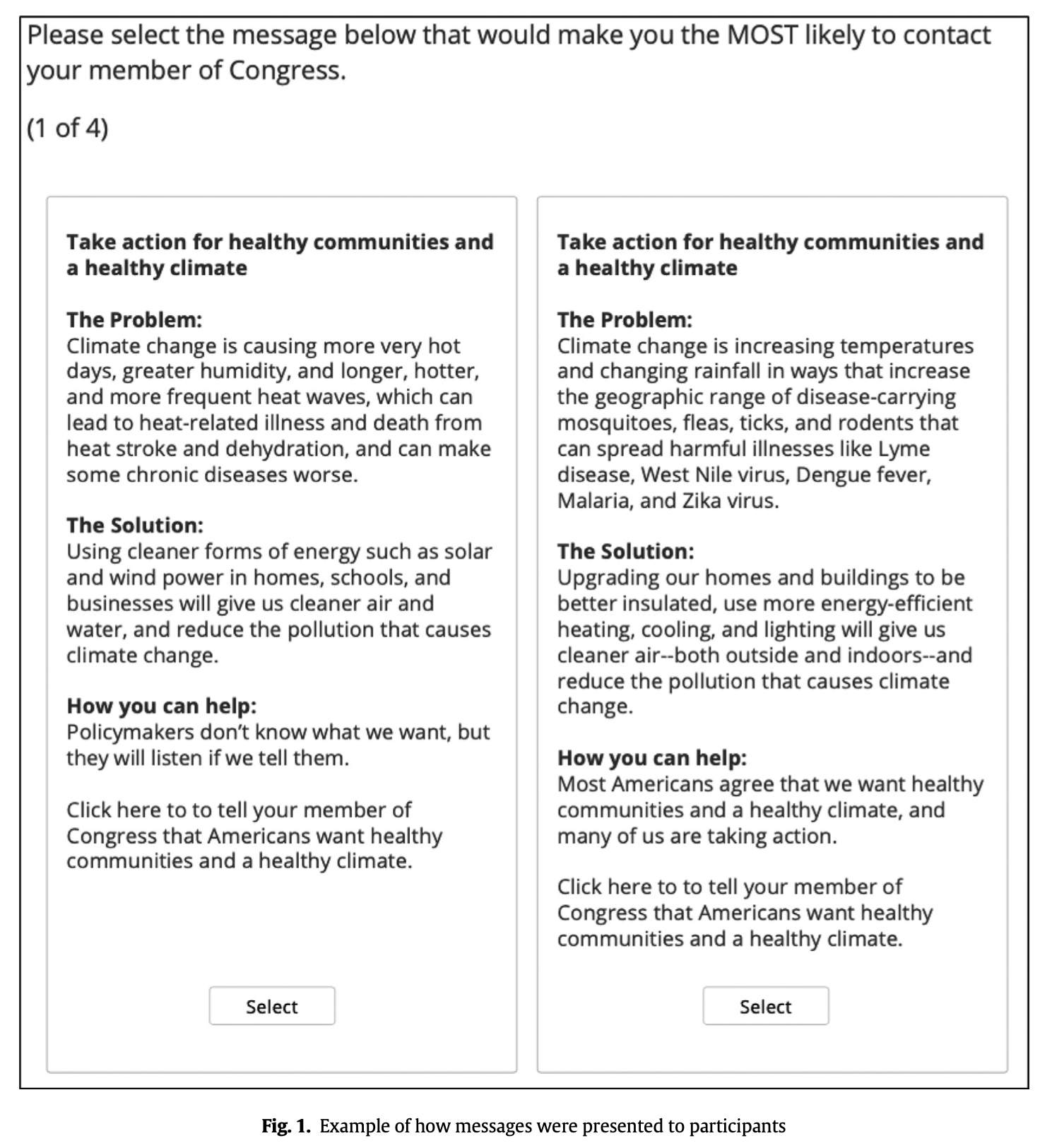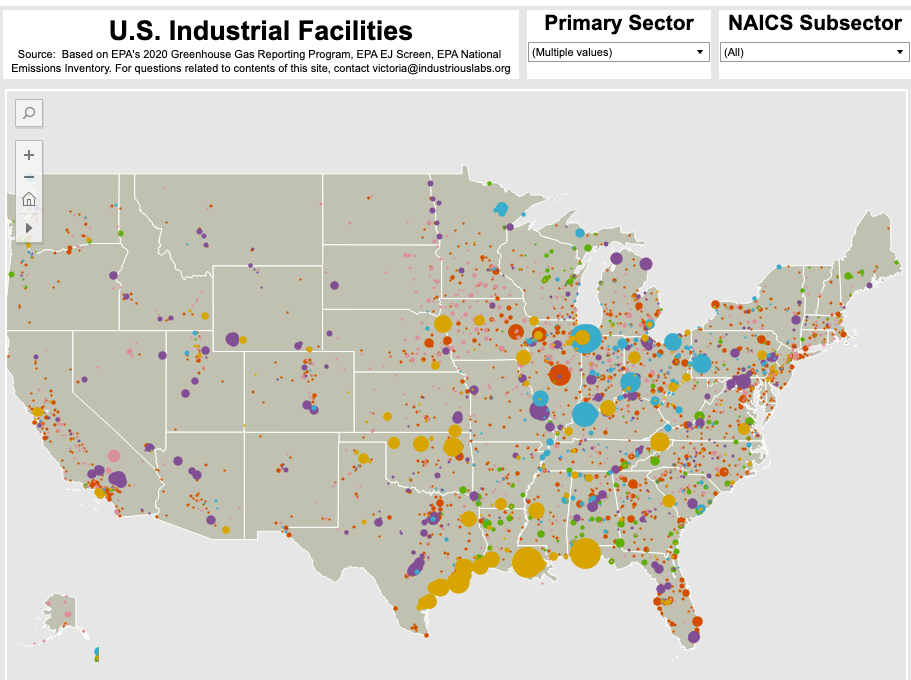Resources
Search below for resources covering the intersection of climate engagement, social science and data analytics.
RESULTS
Poll: Hard Truths - Environmental Racism
The Axios-Ipsos Hard Truths Environmental Racism poll finds that while all Americans are experiencing much the same climate-related challenges, minority Americans are much more likely to experience poor environmental conditions. Along similar lines, Americans across the board report similar experiences with severe weather, but Black and Hispanic Americans are more likely to experience prolonged power outages or water safety issues.
Advocacy messages about climate and health are more effective when they include information about risks, solutions, and a normative appeal: Evidence from a conjoint experiment
A good formula for leveraging health messaging for climate advocacy: Tell people about the health consequences of climate change, health benefits of climate solutions, and include a call-to-action. This experiment found that each of these categories was worth including in a message to help motivate Americans to contact Congress. Within each of these categories, a variety of specific types of information were tested, with the most effective overall combination being a message that first described the negative impacts of climate change on air quality, then explained how transitioning to clean energy will benefit people’s health, and ended by explaining that most Americans support this solution, and many are taking action to advocate for it.
Investing at the Frontlines of Climate Change: A Funder Toolkit on Climate, Health and Equity
To accelerate investments at the intersection of climate change, health, and equity, an online toolkit was developed that aims to help funders gain a sense of the complex and large landscape of issues and actors working at the intersection of these issues. The toolkit provides an overview and landscape of the issues, highlighting themes, profiles of foundations, nonprofits, and hubs of collaboration; and a library of resources made up of case studies, data, and practitioner guides.
Poll: Americans are concerned about health impacts of climate change
Although climate change is often portrayed as a polarizing issue, it is a significant concern for Americans, according to a Research!America survey. Well over half of those surveyed said that climate change is already harming their own health, and similar numbers believe climate change is harming the health of others in their household, of Americans in general, and of people around the world. Two-thirds believe climate change will harm their own health “a great deal” or “a moderate amount” in the next 10 years, and only 14% said they believed climate change would not harm their health or the health of their household at all in the next 10 years.
Understanding the health harms of climate change: A Six Americas analysis
More Americans are alarmed about climate change. Survey research identified six unique audiences within the American public that each responds to the issue of climate change in their own distinct way: alarmed, concerned, cautious, disengaged, doubtful, and dismissive. Between 2014 and 2020, the percentage of the population that is alarmed by climate change more than doubled and by April of 2020 over half of all American adults were in one of the two most worried segments – alarmed (25%) and concerned (28%).
Poll: Americans are Increasingly Anxious About Climate Change’s Impact on Planet, Mental Health
More than two-thirds of Americans (67%) are somewhat or extremely anxious about the impact of climate change on the planet, and more than half (55%*) are somewhat or extremely anxious about the impact of climate change on their own mental health, according to new poll from the American Psychiatric Association (APA).
Across generations, the majority of adults agree climate change is already impacting our health and mental health. Younger adults are more likely to be concerned about climate change on mental health than older adults: 67% of Gen Zers (18-23 years) and 63% of millennials (24-39 years) are somewhat or very concerned about the impact of climate change on their mental health compared to 42% of baby boomers (56-74 years) and 58% of Gen Xers (40-55 years).
The concern cuts across all races/ethnicities and gender. The majority of adults of all races/ethnicities (Hispanic/Latino, white, Black, Native American, Asian, and other) are somewhat or extremely anxious about the impact of climate change on the planet and on mental health. Men and women held similar levels of concern about the impacts of climate change.
Poll: Americans increasingly understand that climate change harms human health
Americans increasingly understand that climate change harms human health, according to recent survey data compared with responses to a similar survey from October 2014. When asked which specific harms to human health will become more common over the next 10 years, due to global warming, respondents' top impacts were: "Heat stroke caused by extreme heat waves" (57%); "Bodily harm from severe storms and/or hurricanes" (57%); "Asthma and/or other lung diseases" (54%); "Bodily harm from wildfires, including smoke inhalation" (54%); and "Diseases carried by insects (54%).
Industrious Labs US Industrial Facilities (2020)
This resource maps various greenhouse gas emissions sources (and their types) around the U.S., allowing for user interaction with the geography. Data from EPA.
Tipsheet: 7 Top Evidence-Based Climate Communications Tips
Social science, field research, and polling suggest seven tried and true climate change communication approaches:
- When to use "Global Warming" vs. "Climate Change"
- How to identify and find your right audience
- The inoculation approach to prepare your supporters for opposition messaging
- Why and how to emphasize scientific consensus
- The importance of peer pressure
- The careful balance between hope & threats
- The value of framing climate in terms of health
Do Americans understand how air pollution from fossil fuels harms health?
Many Americans are unable to name a specific health problem caused by air pollution from the use of fossil fuels, and many more Americans are unaware of the full array of serious health problems caused by air pollution from the use of fossil fuels. The results indicate that Americans are particularly unaware of neurological health problems caused by exposure to air pollution from the use of fossil fuels.
Pagination
- Previous page
- Page 3
- Next page




